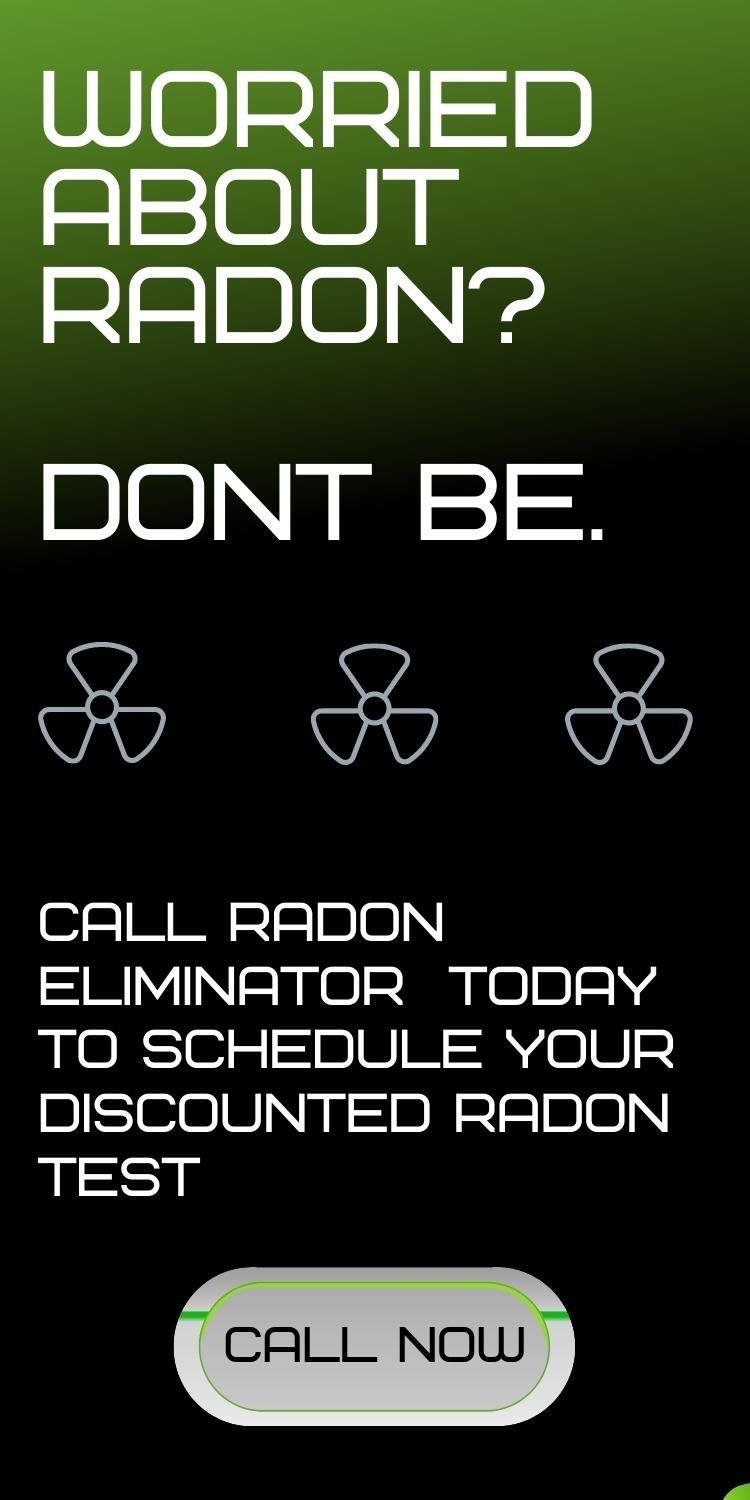Invisible and insidious, radon gas stealthily infiltrates homes, posing a health hazard that many remain oblivious to. Radon, the silent threat lurking in the air we breathe and the water we drink, beckons an urgent question for those aware of its presence. Beneath its scientific designation lies a naturally occurring radioactive menace with origins just as unsettling as its implications for health.
Unassuming basements and ordinary soil can become unwitting hosts to this carcinogenic intruder, silently emitting from the earth's depths and seeping through cracks and openings. As the second leading cause of lung cancer after smoking, radon's health risks cast a long, ominous shadow; the invisible gas's insidiousness lies not just in its stealth but in the cold statistics of mortality and disease it orchestrates. Symptoms like shortness of breath and chest pain are alarming harbingers, signaling the need for vigilance and action.
Deciphering whether your environment harbors this uninvited guest involves a meshwork of practices, from home testing to professional assessments. Understanding what radon is and its impacts on health sets the stage for exploring how we confront radon's pervasiveness. Let's venture into the depth of this issue, pulling back the veil on radon's dangers and examining decisive measures to safeguard our well-being against it.
Radon is clearly a dangerous threat to your life in high doses. However, is it ever safe or even beneficial to your health? Find out by reading our blog post: Can Radon Be Good for You?
Table Of Contents
- What is Radon?
- Health Risks Associated with Radon Exposure
- Should I Visit a Doctor If I've Been Exposed to Radon?
- Assessing Radon Levels
- Reducing Radon Exposure
- Radon in Water Supply
- Contact Radon Eliminator Today!
What is Radon?
Radon is an invisible and odorless radioactive gas that originates from the natural decay of uranium and other radioactive particles found in soil, rock, and groundwater. This stealthy hazard, often unnoticed due to its lack of sensory detection, poses a significant health risk over prolonged periods of exposure, primarily associated with the development and increased risk of lung cancer.
The gas easily infiltrates buildings of all ages and designs, seeping through minute cracks and openings in foundations. Structures such as basements, directly connected to the ground or consisting of porous building materials, are particularly vulnerable to radon accumulation.
Considering the dire health implications related to sustained radon inhalation, awareness of its presence and taking adequate safety measures are crucial for maintaining a healthy indoor living environment.
Definition of Radon Gas
Radon gas is a stealthy intruder: colorless, odorless, and radioactive. Generated through a natural process, it arises from the decay of radioactive elements like uranium present in soil and rock.
Despite being naturally occurring, high concentrations of radon, especially indoors where it can be trapped and accumulate, lead to an elevated risk of lung cancer, particularly in combination with cigarette smoking. Radon’s presence, undetectable by the human senses, makes it a particularly insidious risk factor that cannot be ignored.
How Radon is Formed
At the microscopic level, the story of radon begins with microscopic radioactive metals such as radium, thorium, or uranium nestled in rocks, soil, or groundwater. Over time, these elements decay, a natural transformative process that releases radon gas into the environment. The gas then travels through the soil, finding its way to the surface or into buildings through various entry points. This constant generation and movement of radon gas can create areas with higher concentrations, particularly in enclosed spaces where the ventilation is poor and the gas cannot readily escape.
Sources of Radon
The soil beneath a home is the primary staging ground for radon entry. Yet, this gas is opportunistic, exploiting any avenue for infiltration such as gaps in a building's foundations, crawl spaces, cracks in floors and walls, and construction joints to enter an indoor environment.
Although radon can also be present in the water supply, it is generally considered that radon in the air poses a greater risk to health. Homes with poor ventilation exacerbate the problem by allowing higher concentrations of radon to build up, increasing the potential for health risks to those residing within. A crucial element in mitigating the risk of radon is ensuring good air circulation and addressing any structural deficiencies that can serve as conduits for radon gas.

Health Risks Associated with Radon Exposure
Extended exposure to radon comes with serious health consequences, with lung cancer being the most concerning. At an alarming rate, about 21,000 lung cancer deaths each year in the United States are a direct consequence of radon exposure, making it a public health issue of significant magnitude.
For non-smokers, radon represents the greatest risk of lung cancer, placing them at an unavoidably higher risk when compared to the general population. However, for smokers, the danger of radon exposure compounds, dramatically escalating the likelihood of developing lung cancer.
Given the stealth nature of radon, with it being colorless, odorless, and undetectable without specialized equipment, health issues related to its exposure can often go unnoticed. While symptoms akin to radon poisoning do show up, they often mirror that of other pulmonary conditions, which means that persistent coughs, issues with breathing, and chest discomfort may be erroneously attributed to less threatening ailments. It's this deceptive aspect of radon-related health risks that underline the importance of regular health checkups and radon level testing in homes, particularly for those situated in high-risk areas or for individuals who have experienced known exposure.
Health outcomes such as lung cancer do not arise overnight from radon exposure. They are the cumulative result of years, if not decades, of living in environments with dangerous levels of radon. Consequently, assessment and mitigation, in this case, are better approached as preventive measures rather than reactive solutions. This underscores the criticality of recognizing the risks associated with radon exposure and taking decisive steps to minimize its potential health impacts.
Link Between Radon and Lung Cancer
The connection between elevated radon levels and the development of lung cancer is well-documented and irrefutable. Numerous studies have demonstrated this link, with evidence originating as far back as observations made amongst uranium miners exposed to high concentrations of the gas.
Today, residential radon exposure is recognized as the second leading cause of lung cancer in the United States. Compelling data has revealed that radon is the number one cause of lung cancer among non-smokers, signifying the importance of addressing radon exposure proactively, even among those who do not use tobacco.
Symptoms of Radon Poisoning
Identifying symptoms specifically attributed to radon poisoning is challenging since the symptoms often don't emerge until lung cancer develops, which can be a process of many years. When they do surface, the symptoms are frequently aligned with those of lung cancer, which include persistent coughs, wheezing, chest pain, and in more severe cases, coughing up blood.
A common misconception is that radon poisoning can be diagnosed through routine medical tests; however, no such tests exist. Consequently, individuals experiencing these symptoms should not delay in seeking medical attention as these could be indicative of lung cancer prompted by radon exposure.
Shortness of Breath and Chest Pain
Among the symptoms associated with radon-induced lung cancer, shortness of breath and chest pain are particularly distressing. In fact, around one-quarter of radon-linked lung cancer cases may be asymptomatic, making regular testing and vigilance even more critical.
Those who experience persistent respiratory issues like coughing, wheezing, or chest discomfort—especially when complemented by smoking habits—should not ignore these signs. The nexus of smoking and radon exposure synergistically enhances the overall risk of developing lung cancer, potentially signaling a need for immediate medical intervention.
The Role of Radon in Other Lung Diseases
While lung cancer remains the principal health concern associated with radon exposure, its potential role in other lung diseases should not be overlooked. Given the absence of specific symptoms to directly correlate with radon poisoning, it challenges healthcare providers to adopt a holistic view on patient symptoms that may suggest a link to radon.
Diagnosis or treatment plans for lung cancer derived from radon exposure, however, do not significantly differ from those for lung cancer with different etiologies. What remains paramount is the importance of radon awareness, timely testing, and mitigation to reduce overall risks. For individuals with occupational exposure to radon, like uranium miners, compensation programs offer acknowledgment and remedy, shedding light on the recognition of radon's impact on lung health beyond cancer.
Whether it's for individuals with a history of smoking, those in high radon areas, or working environments with an elevated risk for exposure, the perils of radon cannot be overstated. Attaining a deeper understanding of the health risks and following prescribed guidelines for testing and mitigation can lean the scales towards healthier living spaces and lives less encumbered by the unseen threat of radon gas. Regular health checkups and enhancements to living environments that impede the ingress of radon provide the means to prevent its detrimental long-term effects on lung health.
Should I Visit a doctor if I've been exposed to radon?
While not everyone exposed to radon will develop health issues, it's prudent to monitor for symptoms such as persistent coughing, wheezing, or shortness of breath. If you experience any of these symptoms or have concerns about your exposure level, consulting a healthcare professional is advisable.
However, visiting a doctor immediately after radon exposure may not be necessary for everyone. Your decision should be based on various factors such as the duration and level of exposure, your overall health status, and whether you fall into high-risk categories.
If you're unsure about whether you should see a doctor, it's best to err on the side of caution and seek medical advice. A healthcare provider can evaluate your individual situation, provide guidance on potential health risks, and recommend any necessary tests or treatments. Remember, early detection and intervention can significantly impact your long-term health outcomes when dealing with radon exposure.
Assessing the levels of radon in your home is an essential step in safeguarding your health and that of your family. This invisible and odorless gas can reach dangerous concentrations inside buildings, often without occupants' knowledge. For optimum safety, the Environmental Protection Agency (EPA) has set a threshold of 4 picocuries per liter (4 pCi/L) for radon levels indoors. If your home tests at or above this figure, it's time to consider radon mitigation strategies.
Professional radon contractors offer reliable testing services, and they possess the expertise to advise on effective reduction methods when high levels are detected. Recommendations are typically to lower concentrations below the EPA's action guideline of 4.0 pCi/L to minimize the risk of cancer.
It is particularly crucial to test for radon at certain times: when purchasing a new home, following any renovations, or if you plan to utilize lower-level areas such as basements for living space. Remember, while it's impossible to avoid radon altogether, regularly testing and mitigating high concentrations can significantly reduce your exposure risks.
In terms of statistical norms, the average indoor radon level in the U.S. sits at around 1.3 pCi/L. Outdoors, this average drops to around 0.4 pCi/L. However, it's important to note that radon levels can vary significantly from one building to another, and even from room to room within a single structure. Staying informed and taking necessary actions when levels exceed the recommended safety levels is an essential health precaution.
Testing for Radon in Homes
Testing for radon is crucial in maintaining a safe home environment, especially since an estimated six million homes across the U.S. suffer from above-recommended radon levels.
Conveniently, radon testing kits are available at local hardware stores and clearly marked as being EPA-approved for accuracy. These tests can range from a short few days to long-term testing, which spans approximately 90 days and offers a more comprehensive evaluation of your home's radon levels.
It is recommended to test all levels of your home for radon, from the basement to the top floor, and to repeat the process every two years. Even newly built structures, including those specifically designed with radon-resistant construction, are subject to this two-year testing recommendation.
Upon discovering radon in your home, mitigation steps, such as increasing the building's ventilation and sealing entry points like floor cracks, become necessary. Qualified contractors can assist homeowners with these measures to ensure thorough and efficient radon removal.
Factors Affecting Radon Concentrations in Homes
The omnipresence of radon in both indoor and outdoor environments makes complete avoidance impossible. The main contributor to radon exposure in most people's lives is their own home, where they spend a significant period of time. This fact heightens the need for reliable testing methods.
Homeowners have the option of using do-it-yourself test kits or engaging professionals to measure the radon levels within their homes. It's recommended that long-term testing, which gives an estimate of radon exposure over several months, be utilized for a more accurate assessment.
Should your home test above the 4 pCi/L level, it's important to act quickly to minimize the risk of long-term exposure. Remediation can involve relatively simple fixes such as sealing cracks in the foundation or more involved methods like installing a radon mitigation system. Ultimately, informed decision-making and proactive measures are key to reducing the risk of radon exposure.
Radon Test Kits and Professional Radon Contractors
To embark on radon testing, homeowners can acquire radon test kits through the mail or at a hardware store. These kits include both short-term options, which remain in place for a matter of days, and long-term kits, which provide a more averaged-out radon level over the course of about three months or more. For accurate results, following the test kit instructions is crucial, as is sending the kit for analysis upon the conclusion of the test period.
In cases where professional expertise is preferred or high levels are suspected, qualified radon contractors can be sourced via state radon offices listed on the EPA website. These professionals are trained to test accurately and offer mitigation solutions if radon levels meet or exceed the 4.0 pCi/L threshold. Testing all home floors below the third level is advised, further emphasizing the importance of professional involvement for both residential safety and compliance with EPA guidelines.
Average Radon Levels in Buildings
Radon levels in indoor spaces average around 1.3 picocuries per liter (pCi/L) across the United States, a number that sits comfortably below the EPA's action level. Nonetheless, it's a national average, which means that some homes may exhibit significantly higher levels. The average outdoor radon level, by contrast, is about 0.4 pCi/L.
One of the concerning aspects of radon is that elevated levels have been found in buildings in every state. This gas primarily enters structures through openings in the foundation, including cracks in floors and walls or gaps around service pipes. The widespread prevalence of radon underscores the critical need for nationwide testing and awareness, allowing homeowners to ensure their indoor environments maintain safe radon concentrations.
Radon Levels in Different Regions
Radon levels vary greatly across different regions of the United States. These variations are largely dependent on the geological makeup of the ground, with certain rock and soil types predisposing areas to higher natural radon emissions. This means homes in different geographical locations—even within the same city or neighborhood—can have dramatically different radon levels.
The basement or ground floor of a building typically experiences the highest radon levels due to their proximity to the ground. Due to this variability, and given that about one in every 15 homes has elevated radon levels, local and regional data should inform homeowners' decisions to test for radon. By staying informed and alert to the characteristics of their regional geology and building structures, residents can take appropriate steps to mitigate high radon levels.

Reducing Radon Exposure
Understanding and addressing the risks associated with radon is paramount to preserving the health and well-being of individuals and their families. As the second leading cause of lung cancer in the United States—and the first among nonsmokers—radon presents a silent but significant health hazard. Reducing radon exposure requires a multifaceted approach that includes detection, mitigation, and prevention strategies.
Detection is the first critical step. Homeowners can take proactive measures by utilizing DIY radon detection kits. These kits are straightforward to use, with short-term options that absorb radon for several days before being sent out for analysis. Should tests reveal radon levels at or exceeding 4 picocuries per liter (4 pCi/L), the EPA recommends initiating remediation to reduce these levels as close to the outdoor air levels as possible.
In addition to radon removal, homeowners should adopt strategies to lower the overall risk of radon-related lung cancer. This includes efforts to increase ventilation and airflow within the home and lifestyle changes such as quitting smoking—especially as the combination of cigarette smoking and radon exposure substantially magnifies the risk of lung cancer. Banning indoor smoking is another preventive measure that not only reduces radon risk but also benefits overall indoor air quality.
Professional radon mitigation contractors are available to assess the situation and install systems designed to lower radon levels to under four pCi/L. These systems, which typically involve vent pipes and fans, directly exhaust radon vapors from the ground beneath the foundation to the outdoors, safely away from the home's interior.
By implementing these measures, homeowners can significantly diminish the risks posed by radon, creating a safer and healthier living environment.
Importance of Radon Mitigation
The threat posed by radon gas in indoor environments cannot be overstated, with the correlation between long-term exposure to high radon levels and lung diseases, particularly lung cancer, well-documented. Effective radon mitigation is critical to addressing this silent threat. When properly implemented, radon mitigation systems can successfully remove up to 99% of radon, reinstating homes as safe living spaces.
While some may perceive the installation of radon mitigation systems as a costly expense, the reality is that such systems are relatively affordable, with prices typically ranging between $800 and $1,500. When considering the cost versus the health benefits, including a reduced risk of lung cancer, the investment is a prudent and necessary one for homeowners.
Moreover, certified radon mitigation specialists should oversee the installation and management of the radon reduction systems. These qualified professionals are equipped with the knowledge and tools necessary to not only lower radon levels effectively but also to confirm that they remain below the EPA’s recommended action level of 4 pCi/L through regular post-mitigation testing.
Radon Mitigation Systems and Techniques
Homeowners facing elevated radon levels have various radon mitigation systems and techniques at their disposal. While costs may vary, homeowners can generally expect to spend between $800 to $1,500 for a complete radon mitigation system. This system operates by funneling radon gas from beneath the basement or the ground floor slab to the open air outside, which can be vented through a roof or wall.
The options for radon mitigation include techniques such as home pressurization, improved air exchange through ventilation improvements, the application of plastic sheeting in crawl spaces, sealing foundation cracks, and employing soil suction methods. Of these, the most comprehensive solution is the installation of a radon mitigation system by professional contractors, employing vent pipes and fans for effective gas extraction.
This form of mitigation is more effective over the long term than simpler fixes such as caulking and sealing, offering a sustainable solution that can significantly reduce radon levels. When installed, these systems allow for radon to be dispersed harmlessly, with minimal inconvenience to the homeowner, reinforcing the safety of the living space.
Qualified Contractors for Radon Reduction
Selecting the right professional for radon reduction is a crucial aspect of ensuring a safe home environment. Qualified radon mitigation contractors are experts trained to handle the complexities of reducing radon levels effectively. Their expertise involves designing and implementing systems to maintain radon concentrations below the EPA's guideline of 4 picocuries per liter.
While do-it-yourself solutions like caulking can provide temporary relief by sealing obvious entry points, they rarely offer a long-term solution. Mitigation systems that incorporate vent pipes and fans, which transfer radon vapors from beneath the house to the outside, are far more reliable.
After initial radon testing points to elevated levels, enlisting the services of a professional contractor becomes necessary to safeguard one's health and home. These professionals are crucial not only for the initial reduction but also for ongoing testing—an imperative step in ensuring that radon levels remain within safe boundaries.
Radon Reduction in Crawl Spaces and Basements
In the battle against radon, basements and crawl spaces are often the front lines. Given their proximity to the ground and the sources of radon, these areas typically present the highest radon levels within a home. Mitigation efforts here can be highly effective, with soil-suction radon reduction systems able to eliminate as much as 99% of radon presence.
The mitigation in these areas typically comes in the form of a pipe system that redirects the radon gas directly to the outside via a wall or roof vent. The cost of such systems again falls within the manageable range of $800 to $1,500. Post-installation, it's advisable to conduct regular retesting to ensure the mitigation measures continue to keep the radon levels at bay, perpetuating an environment that is both safe and comfortable for inhabitants.
As we consider the provided guidelines, we understand the critical nature of radon mitigation. Bringing together testing, structural remediation, and lifestyle changes can form a robust defense against this radioactive threat. By taking educated steps and enlisting expert assistance, homeowners can significantly reduce the risk that radon poses and maintain the safety and well-being of their indoor spaces.
Radon in Water Supply
While the dangers of airborne radon are widely acknowledged, the perils of radon in the water supply are equally significant but less well known. This radioactive element can permeate homes through water, with elevated radon levels more likely in water sourced from deep underground wells in comparison to the surface water drawn from lakes or rivers. The concern intensifies when radon-laced water from private wells contributes to indoor radon levels upon being released into the air during household activities such as showering, cooking, and laundering.
Moreover, radon can infiltrate water supplies through the decay of radon-containing substances present in building materials, subtly adding to the cumulative risk of exposure. It is imperative to identify and address radon in water to maintain a safe home environment. Testing water sources for radon becomes critical, especially for households relying on private wells. When high radon concentrations in water are detected, there exist effective treatments aimed at eradicating radon before it becomes an airborne threat, thereby safeguarding residents from potential health risks.
How Radon Can Enter Water
Despite the greater risk of radon entering homes from the soil, the risk from waterborne radon should not be disregarded. Radon enters water supplies when it dissolves into groundwater that feeds private wells, bringing it into homes as part of the water supply. This scenario is less common in homes served by public water treatment facilities, where extensive water treatment processes reduce radon to minimal levels.
Radon from water poses a far lower inhalation risk when compared to radon in the air; nonetheless, it is a concern for households with water sourced from wells or other untreated groundwater sources. Homeowners with private wells should consider testing for radon in water to proactively manage this lower, but present, risk. When high levels of radon are detected in a water supply, treatment options such as aeration or granular activated carbon systems can be used to remove radon before it enters the home.
Health Risks of Radon in Drinking Water
Radon present in the water supply is less likely to have adverse health effects than airborne radon due to the lower amount of radon release from water to air. However, water from deep underground wells can contain higher levels of radon that, when used domestically, contribute to radon exposure as the gas is emitted during water use.
Surface water sources such as lakes or rivers typically have very low concentrations of radon, and, as such, contribute insignificantly to household radon levels. Although radon in drinking water can potentially pose a threat to health, it is widely accepted that the primary pathway for radon-caused health issues, particularly lung cancer, is through inhalation rather than ingestion. Yet, conscientious homeowners should remain vigilant as radon exposure, regardless of the source, aggregates over time and may pose significant health risks.
Radon Testing for Water
Detecting radon in water necessitates a separate examination from the tests used for airborne radon. Homeowners drawing their water from private wells are encouraged to carry out water tests specifically for radon. Conversely, for those concerned about radon in public water supplies, consulting with the water provider can offer reassurance about radon levels and treatment processes.
When testing verifies high levels of radon in water, homeowners can pursue remediation services that employ techniques to extract radon before it transitions into the home environment. Regular testing and monitoring are advisable to ensure that remediation efforts are effective and that radon levels in water remain safely managed.
Contact Radon Eliminator Today!
At Radon Eliminator, we understand the critical importance of safeguarding your health and home from the dangers of radon exposure. Radon is a silent threat, lurking undetected and posing serious risks to you and your family. With radon being the second leading cause of lung cancer in the U.S., addressing this issue promptly is paramount.
Our professional radon mitigation services offer a reliable solution to mitigate radon levels in your home, reducing the associated risks by up to 99%. By choosing Radon Eliminator, you're taking proactive steps towards creating a safer living environment for yourself and your loved ones.
Don't wait until it's too late. Take action now to protect your health and ensure the safety of your home. Contact Radon Eliminator today for a comprehensive radon mitigation solution and enjoy peace of mind knowing you've made the right choice for a healthier tomorrow.
References:
https://www.michigan.gov/egle/about/organization/materials-management/indoor-radon/frequently-asked-questions-about-radon#if_i_find_a_radon_probelm
https://sosradon.org/health-physician
https://www.atsdr.cdc.gov/csem/radon/clinically_assess.html
https://www.healthline.com/health/healthy-home-guide/radon-poisoning
https://www.cancer.org/latest-news/radon-gas-and-lung-cancer.htm





